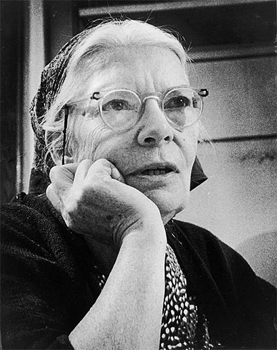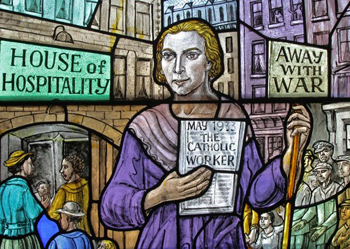For Sunday May 7, 2017
Lectionary Readings (Revised Common Lectionary, Year A)
Acts 2:42–47:
Psalm 23
1 Peter 2:19–25
John 10:1–10
Now that I'm sixty-one, I can no longer avoid the R-word, as in retirement. When I think about the conversations among my friends and neighbors who are my age, I hear us all asking a similar set of questions about the how, when, where, and even why of retiring. The answers to these questions depend in large part on how much money I have—my financial equity.
But my good friends the Steins have re-framed these questions for me. Heidi is a social worker who serves the elderly sick in their homes, so she sees the consequences of social isolation. Art is a chief financial officer, so he knows the importance of financial equity. But what really interests the Steins is not money but community—not financial equity but social equity.
Prioritizing community has led Art and Heidi to consider the "cohousing" option. The cohousing movement started in Denmark in the late 1960s. Today it's an international movement. In the United States, there are about 160 cohousing communities in 25 states.
Cohousing participants commit themselves to live intentionally in community. Families live in private housing, but share public spaces, responsibilities, meals, resources, activities, and events. Shared care for children and the elderly is often part of the mix. Neighbors collaborate to plan and manage their communities. Decisions often require consensus.
Cohousing is one response to the lack of social equity that the political scientist Robert Putnam of Harvard documented in his book Bowling Alone: The Collapse and Revival of American Community (2000). Putnam showed how many people today feel disconnected and isolated. We've accumulated what he called a growing "social-capital deficit" that leaves people in our culture longing for a "more collectively caring community."
A connected community of intentional caring and sharing is exactly what Luke describes in this week's gospel. Luke writes:
 |
|
Dorothy Day.
|
"They devoted themselves to the apostles' teaching and to the fellowship, to the breaking of bread and to prayer. Everyone was filled with awe, and many wonders and miraculous signs were done by the apostles. All the believers were together and had everything in common. Selling their possessions and goods, they gave to anyone as he had need. Every day they continued to meet together in the temple courts. They broke bread in their homes and ate together with glad and sincere hearts, praising God and enjoying the favor of all the people. And the Lord added to their number daily those who were being saved."
Later Luke describes how "no one claimed that any of his possessions was his own, but they shared everything they had. There were no needy persons among them. From time to time those who owned lands or houses sold them, brought the money from the sales and put it at the apostles feet, and it was distributed to anyone as he had need."
Barnabas sold his land and contributed the proceeds to the community. A few pages later, Luke describes financial assistance for widows (including complaints about how the program was administered!), and a few pages after that, we read about famine relief efforts.
A couple generations after Luke, writing from Rome, the theologian Justin Martyr (c. 100-165) summarized the appeal of Christian community: “We who once took most pleasure in accumulating wealth and property now share with everyone in need; we who hated and killed one another and would not associate with men of different tribes because of their different customs now, since the coming of Christ, live familiarly with them and pray for our enemies.”
And down in north Africa, Tertullian (AD 155–220) similarly wrote about the well-known and well-deserved reputation of believers for social generosity that built bridges of community rather than walls of separation: "Our care for the derelict and our active love have become our distinctive sign before the enemy… See, they say, how they love one another and how ready they are to die for each other."
 |
|
Dorothy Day, stained-glass window at Our Lady of Lourdes Church in the Staten Island borough of New York.
|
Down through the centuries, Christians have found many different and creative ways to live lives of social generosity and caring community. This past January, Kate Hennessy, the youngest of Dorothy Day’s nine grandchildren, published a new biography of the woman that many believe will one day be canonized as a saint. The book is called Dorothy Day: The World Will Be Saved By Beauty (2017).
Along with Peter Maurin, Day founded The Catholic Worker Movement in 1933. It espouses a strong belief in the God-given dignity of every human being. Today over 185 Catholic Worker communities remain committed to nonviolence, voluntary poverty, prayer, and hospitality for the homeless, exiled, hungry, and forsaken. Catholic Workers protest injustice, war, racism, and violence of all forms.
Living the Christian life in social isolation, disconnected from others, is a contradiction in terms. Maya Angelou (1928–2014) had it right in her poem "Alone."
Lying, thinking
Last night
How to find my soul a home
Where water is not thirsty
And bread loaf is not stone
I came up with one thing
And I don't believe I'm wrong
That nobody,
But nobody
Can make it out here alone.Alone, all alone
Nobody, but nobody
Can make it out here alone.
In John 10:10 for this week, Jesus says that he came to give us "abundant life." That abundant life, with its surplus of social equity, is only possible as life together. “We have all known the long loneliness," Dorothy Day once said, "and we have found the answer is community.”
Image credits: (1) Wikispaces.net and (3) AmericaMagazine.org.





